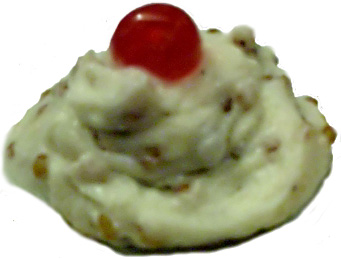...Best of Sicily presents... Best of Sicily Magazine. ... Dedicated to Sicilian art, culture, history, people, places and all things Sicilian. |
by Roberta Gangi | ||
Magazine Index Best of Sicily Arts & Culture Fashion Food & Wine History & Society About Us Travel Faqs Contact Map of Sicily |
Sicily's answer to rice pudding is something called cuccìa, based on a similar recipe but made with wheat grain - or "wheat berries" as they are commonly known. Only in early December, for the feast of Saint Lucy, are you likely to find cuccìa in Sicily. On her feast day (December 13th), few restaurants, pizzerias or pastry bars in Sicily serve baked wheat products, and some bakeries may be closed. Those eateries that are open serve cuccìa and rice balls (arancine). Saint Lucy is the patroness of Syracuse. The cuccìa marks her saving the island from starvation in 1643, when a ship arriving in port loaded with grain was commandeered and its cargo seized to feed the people. They didn't bother grinding the wheat into flower, but simply boiled it. Historians debate whether that famine and others resulted more from a bad season or from poor administration of Sicily's agriculture and markets by greedy landlords, but that's another story. Of course, wheat grains differ from rice grains, even in Italy. Especially in Italy, it may be said. The world's creamiest, most tender rice is something called arborio grown for centuries in Italy's Piedmont region and used in risotto and arancine. It is well-suited to rice pudding. Wheat berries, on the other hand, remain somewhat firm even after extensive boiling, never achieving the texture of rice or creating much of a cream. The point is that, unlike rice pudding, cuccìa owes most of its flavour and creaminess to the milk and cream used in its preparation, rather than the wheat grains. Incidentally, the fact that the durum ("hard") wheat cultivated in southern Italy is especially firm - better suited to farina for pasta than anything else - only adds to the strange texture of wheat pudding. Cuccìa recipes are similar to those for rice pudding, including milk, cream, sugar, corn starch and vanilla. One might add a few small cubes of dried citron to the mixture just before chilling it. In recent years some "creative" Sicilian chefs have decided to add chocolate, or even take a shortcut and mix the boiled berries with the sweet ricotta cheese filling used in cannoli. Don't do that. It is a heresy of which Saint Lucy would never approve. About the Author: Roberta Gangi has written numerous articles and one book dealing with Italian cultural and culinary history, and a number of food and wine articles for Best of Sicily Magazine. | |
Top of Page |
 Particularly
in Italy, certain foods are associated with certain feasts and occasions.
Sicily is not unique in this regard (Americans' Thanksgiving turkey comes
to mind), but it is certainly a good example.
Particularly
in Italy, certain foods are associated with certain feasts and occasions.
Sicily is not unique in this regard (Americans' Thanksgiving turkey comes
to mind), but it is certainly a good example.